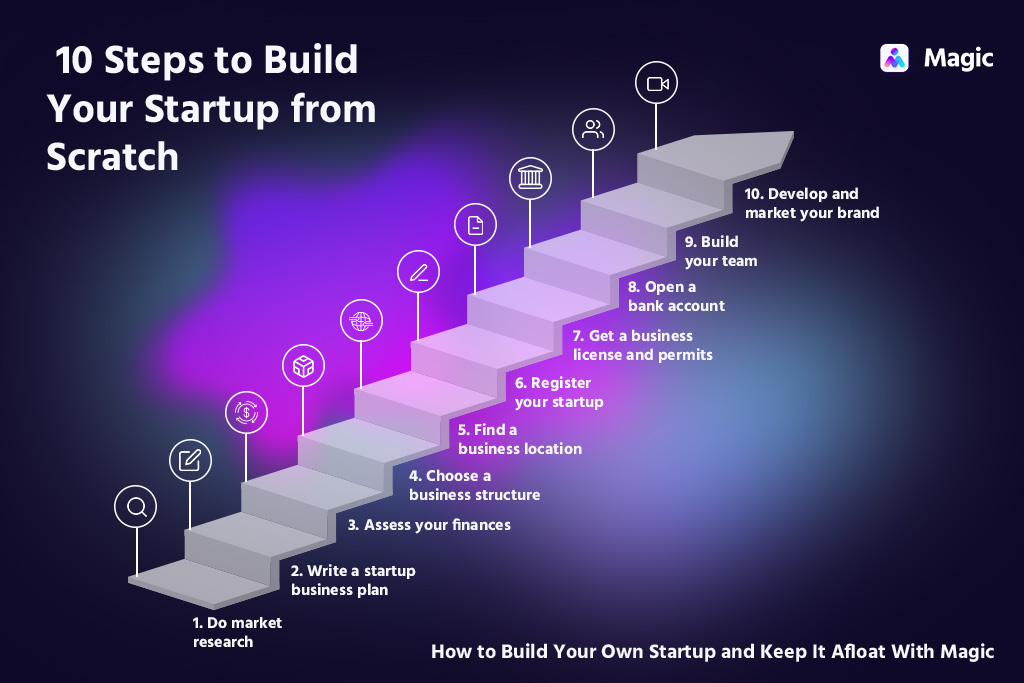Building a startup as fast as possible comes with a high risk of failure, especially in the first two to five years. According to Zippia, only 40% of startups turn a profit; 30% fail and the other 30% keep losing money in their lifetime.
Knowing what needs to be done before you build your own startup will prepare you for the path to success allowing you to scale fast, overcome small business challenges, and even find new opportunities.
Magic provides cost-effective support in building your business quickly. Grow your team and boost your productivity with a virtual assistant who will help in admin work, recruitment, marketing, and more. Read on about our guide to starting and maintaining your business!
What Is a Startup: Types and Business Ideas
A startup is a business venture in the initial stages of operations that focuses on scaling up and doing it fast. It features a product or service an entrepreneur believes there is a demand for.
Its main goal is to target a niche market with a minimum viable product (MVP) and improve on it. In creating a startup, identify the type that complements how you can grow your business. Here are six types of startups with low-investment business ideas to review:
Scalable startups
A scalable startup takes a unique idea intending to create an easily repeatable and expandable business. To support high-growth initiatives, a scalable startup seeks capital that is usually funded by angel investors and venture capitalists.
A good scalable startup idea is a real estate business. It’s an easy business to finance and build once you have equity in real estate.
Buyable startups
A buyable startup is built to be sold to a larger firm in its niche so it can be improved over time. They are ideal for those who want to build on an idea with great growth potential but don’t want to commit to running it long-term.
Most buyable startups are tech companies. They are largely web and mobile app startups that are bought off by internet conglomerates such as Google and Meta.
Lifestyle startups
A lifestyle startup is established by a person looking to turn a hobby or interest into a profitable business. Its main goal is to be a platform for business owners to pursue their passions while also earning on the side.
Due to this, lifestyle startups have little to no intention to scale up. An example of this is a dancer offering lessons or a baker selling limited batches of baked goods.
Small business startups
The most common type of startup is a small business startup. It often remains at a modest scale for the rest of its lifetime. They are self-funded and grow at their own pace.
Small business startups are a lenient and enjoyable form of livelihood. This is because there’s no need to conform to the needs of investors. Common small business startup ideas are a restaurant or a grocery store.
However, a startup could be just about anything, and this broadness can make it difficult for business owners to build them. In these instances, it’s best to get specific advice from experts. For example, this article from Subbly walks you through launching your successful subscription box business. It also talks about marketing tactics that work well in the subscription box industry.
Offshoot startups
An offshoot startup is a company that starts small with a product or service and is globally recognized later on. It branches off of a larger parent company to adapt to changes in customer preferences, new technology, and competition.
An example of an offshoot startup is a dropshipping business. It may have diverged from a traditional retail store to adjust to the new shopping preference of buyers.
Social startups
Dedicated to doing good for society, a social startup raises awareness about a certain issue. It also actively makes a difference that benefits its workers, community, or area to which it belongs. A popular idea for a social startup is a sustainable fashion venture with items typically made by local craftsmen.
10 Steps to Build Your Startup from Scratch
Everyone has ideas but not everyone can turn them into successful startups. Even small business startups require a lot of planning and decision-making including doing a series of legal activities to get them off the ground.
It’s a long process that ensures your MVP can develop over time and you can scale up without any hiccups. Below are the important steps you need to take to build your own startup:
1. Do market research
Market research will inform you if your idea has the potential to become a successful business. It gathers information that also helps you determine the target market for your small business startup ideas.
Some methods on how to conduct market research are:
- Survey – A method that fields a series of questions to a group of people to gain insight into the buying prospect and attributes of the target market.
- Interview – A one-on-one discussion with people in your target market to collect information and consumer opinions about a range of topics.
- Focus group – A group discussion of six or more people led by a moderator to pinpoint buyers’ feelings and perceptions about a product or service.
- Customer observation – Also known as field research, researchers directly or indirectly monitor how consumers behave and interact in a natural setting.
2. Write a startup business plan
A business plan acts as your guide on how to structure, run, and grow your business. Small business startups use it to convince people to become investors or business partners.
The main components of a business plan are:
- Executive summary – Tells your readers what your startup is about and why it’ll be successful.
- Business description and structure – Explains what your startup is offering and why you’re doing it.
- Market analysis and strategies – Shows sales forecasts, public relations, trends, and themes of your business against your competition.
- Management and personnel – Supplies an organizational chart and data on the small business owner and the people who will contribute to the success of the venture.
- Financial documents – Provides projections on profit and loss, balance sheets, cash flow statements, and capital expenditure budgets for the next three to five years.
3. Assess your finances
Funding a startup business is crucial for any business owner. It affects how to structure, run your startup, and even overcome small business challenges. There is no one-size-fits-all financial solution to build your own startup. You will need to decide if you will be self-funding, getting venture capital, or a small business loan.
4. Choose a business structure
A business structure dictates how small business startups define ownership, limit personal liability, and manage taxes. There are four types of business structures you can choose from:
- Sole proprietorship – a person has complete control over a business
- Partnership – two or more people own a business together
- Limited liability company – a private limited company that combines the pass-through taxation of a sole proprietorship or partnership with the limited liability of a corporation
- Corporation – a group of people acting as a single legal entity but is distinct from its owners
5. Find a business location
Small business startups strategically choose where to locate their business. It dictates the taxes, zoning laws, and regulations the startup will be subject to. Choosing a business location also depends on your target market, business partners, and your liking.
6. Register your startup
Once the business structure and site are determined, you’ll need to register your business as a distinct legal entity. Enlisting a business name to state and local governments yields personal liability protection, legal benefits, and tax benefits.
7. Get a business license and permits
Small business startups need to obtain licenses and permits from federal and state agencies to legally operate. An application for an Employer Identification Number should also be submitted to pay federal and state taxes.
The business license and permits you need depend on your location and industry, and some could expire after a limited period. Some business startup legal requirements you must adhere to include:
- Trading license
- Sales tax permit
- Trademark
- Insurance
- Zoning laws
- Health and safety laws
- Non-disclosure agreements
8. Open a bank account
A business bank account allows you to accept credit and debit card transactions while staying legally compliant. Setting up a business bank account includes:
- Checking
- Savings
- Credit card
- Merchant services accounts
- Benefits such as personal liability protection
9. Build your team
Even small business startups need a team to get them off the ground. Look into your business operations and fill in roles according to your business structure and funding.
Define responsibilities clearly for each team member and establish the best productivity system for your business. Your team can also include business partners and third-party personnel like virtual assistants to help run your business better.
10. Develop and market your brand
To build your own startup, you also have to build a brand. Your brand will help sell your product to prospects through traditional and digital marketing. Having a brand can provide many benefits such as:
- Spread the word about your startup
- Reach out to your target audience
- Improve how you market your product using customer data
5 Small Business Challenges and How to Deal With Them
After building your startup, you also need to work just as hard to keep it afloat. But running a small business comes with certain roadblocks such as recruitment, brand awareness, sales, and workflow management, among others.
Here’s how to overcome business challenges you may face:
1. Limited resources
According to a Semrush survey, the lack of time and resources ranks first among small business challenges in marketing. This is followed by having a limited budget. Below are some digital marketing practices small businesses need to follow for a robust campaign:
- Email marketing is a low-cost way to reach a wider audience. This way, you can promote your product while also building your brand. Choose an industry-specific approach, rather than adopting generic strategies that might not work optimally. For instance, effectively handling email marketing for construction requires different tactics compared with retail or hospitality.
- Social media, while mostly seen as a platform for casual interactions, can be a powerful marketing tool. You can engage with your prospects and current customers, promote your content, and improve your online presence.
- SEO, or search engine optimization, is a great way to boost the search ranking of your website. It brings long-term and sustainable results. This way, your business will be more visible to people with an interest in the products and services in your niche.
Without enough time, budget, and employees, your lead generation techniques might not yield the best results. Getting leads is another business challenge to look out for as you build your own startup. In fact, it ranks fourth in the same Semrush survey.
Here are some of the most common lead generation challenges you may face and what you can do about them:
- No organized system to process leads
- Having more leads won’t matter if your funnel isn’t organized to process your leads. You need to have processes in your funnel that cater to every stage of the buyer’s journey.
- Not tracking your lead generation efforts
- To get leads, you’ll need hard data to determine which tactics are working and which are not. From there, you can revise your strategy. To ensure you get your money’s worth, acquire the right CRM software and team members to track and manage your progress.
2. Bad customer service experience
Whether your startup is a B2B or B2C business, customer service should always be a focus. It’s more than just answering phone calls—it’s providing a positive experience. Today, customer service can be done through email, the web, and social media.
Most businesses, big or small, are maximizing their efforts in this department as revealed by Gartner’s Customer Experience Management Survey, however; these issues are constant across many sectors:
- Not knowing the answer to a query
- Agents are expected to answer all the questions and concerns customers may raise. Although that expectation is valid, agents must still practice honesty. This can be done by reassuring the client that you’re looking for the answer. You can also ask someone from the team who’s more knowledgeable about the issue.That said, a customer support script should be devised to guide and train your agents. Having an escalation management process in place will also streamline how to deal with different queries.
- High customer volume
- Even as small businesses, there may be days when your team has to deal with several customers at a time.Identifying customer pain points and solving them right from the start can lessen your ticket volume. You can also set up a help desk, FAQ page, or chatbots to help answer common concerns.
- Dealing with angry customers
- No matter which industry you work in, you will face angry customers. There is no one way to deal with this kind of situation. That’s why you need to train agents in the proper de-escalation process to handle complaints without upsetting your client further.
3. Poor cash flow management
Managing cash flows can help you build your own startup into a sustainable business. If not handled properly, it can be one of the main causes of your failure. Some cash flow problems you may face include:
- Not setting a cash flow budget
- This refers to the estimate of the cash you expect to receive and pay in a certain time frame. Staying on top of this will help you allot the proper budget for each aspect of your business.
- Growing too fast
- While scaling up your business is a goal, growing too fast can become more of a problem if not handled properly. Avoid sudden jumps in overhead expenses (e.g. hiring, inventory, tool upgrades) that can upset your cash flow, especially if you lack proper checks and balances.
- Delay in payment processing
- Getting the money paid to you is not as quick as one may expect. With e-payments, processing may often take some time due to the bank’s processes. Still, it’s your duty to sustain your cash flow to maintain business operations.
4. Lack of knowledge and experience
Building your startup requires a broad set of skills, and you can hardly be an expert at all of them. While it’s important to have a clear idea of what you want to achieve, you can leave certain specifics to people with more experience.
Streamline operations to provide better support and quicker response to you and your business operations. Keep communications open and encourage rapport so everyone in your company can have the proper assistance in case help is needed.
Ensure concerned teams coordinate to complete projects on time and within budget. For example, having marketing, project management and finance teams all on the same page can ensure a good website launch.
Hire trained and experienced virtual assistants to assist in building your business according to their areas of expertise. Remote assistants can boost your productivity in system processes that work, efficient record-keeping, and updated Standard Operating Procedures (SOPs).
5. There’s too much work to do
On top of all the small business challenges listed above, business owners would sometimes have to take on administrative work. This is especially true at the start of their business due to limited resources and time.
Back office work, while crucial in running a business, can waste your time when it comes to making important decisions. Boost the productivity and efficiency of your operations by hiring a virtual assistant. They will take care of all admin work such as:
- Data entry
- Record maintenance
- Calendar management
- Email management
Even a great idea or business venture cannot prosper without the appropriate support. An experienced virtual assistant serves as your unifying glue to reduce unnecessary delays and mix-ups in updating your calendar, setting up meetings, and many more.
Building Your Startup with Magic
Building a startup entails understanding and dealing with many issues from financing, human resource, sales, marketing, and more. You don’t have to do everything though! Get on-demand assistance from Magic to make processes more efficient and manageable.
Magic is a quick and easy solution to finding a virtual assistant to delegate tasks to. A Magic Virtual Assistant can ease your workload and help overcome small business challenges so you can hit your startup goals.
Some of the roles a Magic Assistant can perform in small business startups include:
- General Virtual Assistant – A virtual assistant can act as the administrative backbone of your startup so you can concentrate on scaling up. They can help with documents to start your business and take on day-to-day tasks.
- Bookkeeping Assistant – They can manage your everyday accounting concerns such as invoices, tax filing, and financial reports.
- Sales Assistant – They can help streamline your sales process by getting more leads.
Build your own startup easily with a flexible workforce. Book a call with us today and get matched with a virtual assistant most suited to your business needs!








